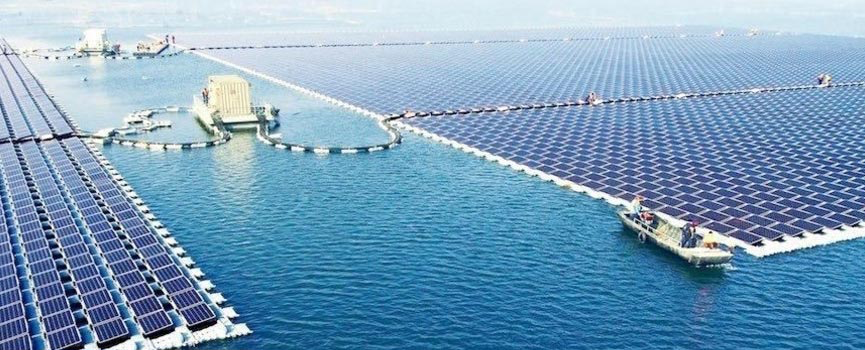Zimbabwe plans to install floating solar panels on at least two of the country’s dams, including Lake Kariba. This move aims to increase the nation’s electricity supply and address power deficits. The project begins with an initial 150MW of solar panels to be installed on Lake Kariba by early 2025, according to Gloria Magombo, the country’s secretary for Energy and Power Development.
“This is just the beginning,” Magombo stated during a press briefing in Harare. She added that the private sector has applied to install an additional 600MW of floating solar capacity, although she did not disclose the interested parties. Magombo also confirmed plans for a similar installation at the Mutirikwi Dam.
The announcement follows a tender published by the African Development Bank (AfDB) in May. The AfDB invited consulting firms to conduct a feasibility study for floating solar projects on Lake Kariba under the Sustainable Energy Fund for Africa (SEFA)’s Africa Hydropower Modernisation Programme (AHMP). The Zambezi River Authority, a bilateral organization owned by Zambia and Zimbabwe, will oversee the project. The Authority manages the Kariba Dam Complex and develops hydropower on the Zambezi River.
A recent severe drought has forced the Authority to reduce water allocation for hydroelectric power generation. In a June 3, 2024, update, the Authority reported that lake levels are lower compared to the same period last year. “The Authority will continue to closely monitor the hydrological outlook and the performance of the Kariba Catchment,” the statement read.
The addition of floating solar panels could help alleviate the region’s electricity deficit. Both Zambia and Zimbabwe, along with the Southern African Power Pool (SAPP) Region, face power supply shortages. The AfDB noted that these shortages are exacerbated by poor hydrology in the Zambezi catchment and over-utilization of the reservoir. “Floating solar would increase capacity and improve the utilization of the hydro/solar system,” the AfDB stated. “It would also provide a substitute for fossil-fuelled plants due for decommissioning and enable better hydrologic regulation.”
A World Bank report from December 2023 highlighted the ongoing electricity challenges in Zimbabwe. Despite recent achievements, the country still faces significant power deficits and slow progress toward universal electricity access. The government has set ambitious targets for 2030 to ensure a reliable energy supply and expand electricity services to most of the population.
In 2020, Zimbabwe had a generation capacity of 1,585MW compared to a peak demand of 1,900MW, resulting in power outages of 12–14 hours a day. Although the government commissioned an additional 600MW at the Hwange power station in 2023, the installed capacity remains insufficient to meet demand. Rolling blackouts continue to burden Zimbabwe’s economic growth and competitiveness.
The World Bank report noted improvements in access to electricity but also highlighted the slowing pace of rural electrification. “Zimbabwe has seen notable improvements in electricity access, but the pace of rural electrification has slowed down,” the report stated.
Floating solar panels offer a promising solution to Zimbabwe’s energy challenges. They can harness solar energy while minimizing land use and water evaporation. By combining solar power with existing hydroelectric infrastructure, Zimbabwe can improve its energy resilience and reduce reliance on fossil fuels.
Magombo expressed optimism about the project’s potential to transform Zimbabwe’s energy landscape. “This initiative marks a significant step towards achieving our energy goals and ensuring a sustainable and reliable power supply for all Zimbabweans,” she said.
The feasibility study and subsequent implementation of floating solar panels on Lake Kariba and other dams are crucial for Zimbabwe’s energy future. If successful, the project could serve as a model for other countries facing similar energy challenges. As Zimbabwe moves forward with this innovative approach, the government, private sector, and international partners must collaborate closely to ensure its success.
The AfDB and the Zambezi River Authority will play key roles in the project’s development. Their expertise and support will be vital in navigating the technical and logistical challenges associated with installing and maintaining floating solar panels.
In conclusion, Zimbabwe’s plan to install floating solar panels on Lake Kariba represents a bold and innovative step toward addressing the country’s energy deficits. By leveraging renewable energy sources and modern technology, Zimbabwe can enhance its energy security, support economic growth, and improve the quality of life for its citizens. The success of this project will depend on effective collaboration, thorough planning, and sustained investment in the country’s energy infrastructure.
Source: ESI Africa



